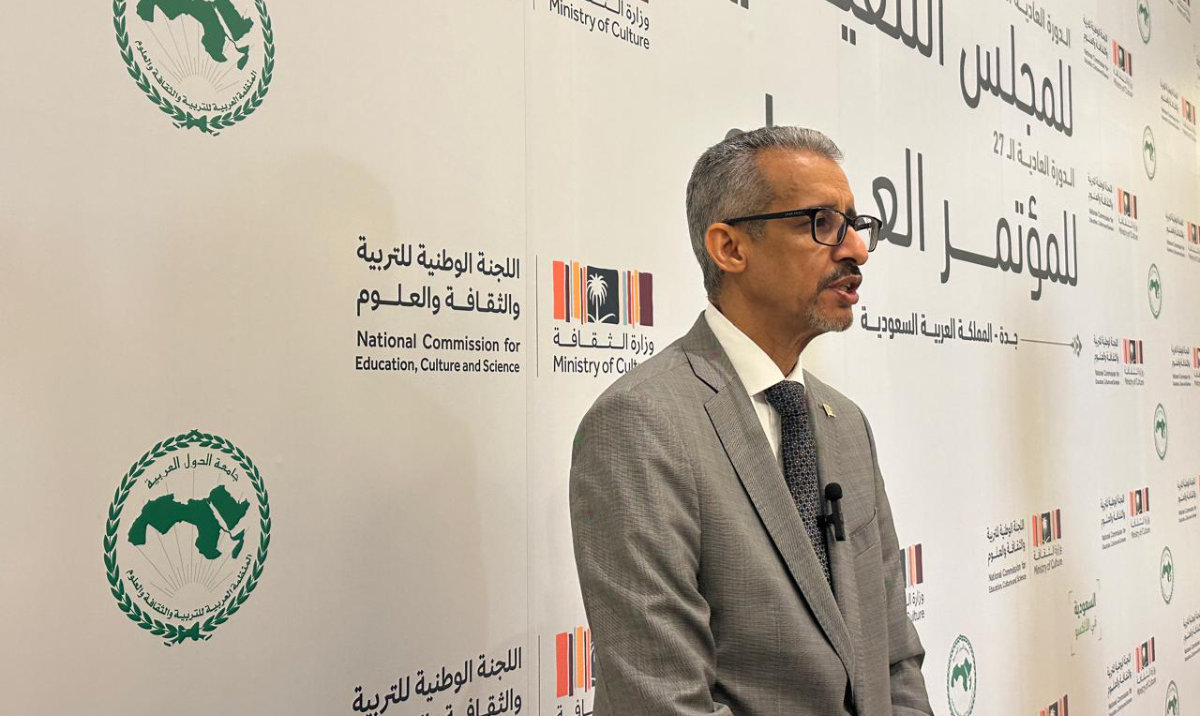JEDDAH: The 121st session of the Executive Council of the Arab League Educational, Cultural and Scientific Organization concluded in Jeddah on Wednesday.
During the two-day event, ministers and other representatives from 22 Arab nations discussed important topics, initiatives and proposals related to knowledge sharing, scientific advancement, and innovation within the framework of the work of the organization. It will be followed on Friday by its General Conference.
In an exclusive interview with Arab News on Wednesday, Mohammed Walad Amar, the director general of the organization, said: “The aim of this conference is to approve the organization’s budget for the next two years and to endorse its selected projects based on the proposals and needs of Arab countries, envisioning a real acceleration toward the goals of our Arab nations in the fields of education, culture and information technology, as well as in various areas prioritized by Arab countries in cultural and educational work.”
Addressing the crisis in Gaza, Walad Amar said the organization condemned what is happening there and called for support for Palestinians in the fields of the education and culture.
“The organization sees this aggression not only as an attack on the (Palestinian) people but also as an assault on Arab identity in general, and an assault on the Palestinian educational approach,” he added.
A key aspect of ALECSO’s cultural activities and initiatives, Walad Amar said, is its submissions to the UN Educational, Scientific and Cultural Organization with the aim of preserving Arab culture and heritage through inclusions on the Intangible Cultural Heritage list.
“To date, we have successfully accredited the initial submissions concerning the palm tree, Arabic calligraphy, traditional clay architecture, metal engraving and wedding customs,” he said.

Mohammed Walad Amar, the director general of ALECSO. (AN photo by Nada Hameed)
“Our approach aligns with the Arab strategy, which prioritizes both tangible and intangible cultural heritage, fostering awareness across Arab nations about its significance.”
These efforts are complemented by educational programs, Walad Amar said.
“Given the current landscape, our primary challenge lies in revising curricula to reflect present realities and anticipate future needs,” he added.
ALECSO recently staged the fourth Arab Programming Week at King Salman Global Academy for Arabic Language, which was attended by about 250 teachers from Arab countries. The organization has also created a guide for teaching students in Arab primary and secondary schools about artificial intelligence and is developing an Arab charter for the ethical use of AI.
“We recognize the inevitable influence of artificial intelligence and the challenges it presents,” Walad Amar said.
“While embracing its advancements, we prioritize safeguarding the privacy of our Arab nations. Our aim is to harness the positive aspects of AI while avoiding any negative impacts. Achieving this requires strengthening our educational systems to equip our children with the necessary skills and awareness.”
Two topics discussed during the Executive Council session that were described as particularly significant were the establishment of an ALECSO Partnership Forum, which was initiated by the Kingdom, and an Arab Cultural Week within UNESCO, both of which received unanimous approval.
“The Kingdom consistently presents us with positive and constructive initiatives that unite Arab educational and cultural efforts across various scientific fields,” Ahmed Sameer, the assistant secretary-general of the Yemeni National Commission for Education, Culture and Science, told Arab News.
Issam Louhichi, who oversees operations at the National Commission for Education, Science and Culture in Tunisia, told Arab News that a consensus on ideas during the two-day session meant that a number of decisions were quickly agreed.
“It provided an opportunity to practice democracy within our Arab world through voting on resolutions and exchanging successful experiences in various educational, scientific, and cultural fields,” he added. “This Executive Council serves as an opportunity to present proposals from countries, with the aim of including them in the General Conference agenda (on Friday).
“It was an excellent opportunity to discuss the core issue of Palestine by presenting several proposals. Algeria proposed integrating lessons within educational curricula across Arab countries each year to educate youth about the history and justice of this issue.”
“Today, we were presented with a proposal from the Kingdom of Saudi Arabia regarding the Arab Cultural Week at UNESCO. This initiative, which involves all Arab countries, including Tunisia, aims to foster collaboration and ensure its success. We will contribute diverse insights and experiences spanning cultural, historical, educational and scientific domains.”
Other topics discussed during the two-day session, which was hosted by the Saudi National Committee for Education, Culture and Science, included the challenges that Arab nations face in the fields of education, culture and science, innovative solutions to those problems, and ways to forge new partnerships that can broaden the horizons of for education and creative thought.































